

By
Emily C. A. Snyder
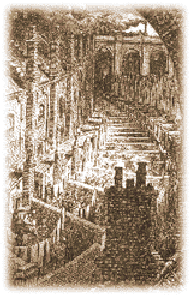
Waaay back at the end of Sophomore year in High School, somewhere around 1993, I thought, "Hey! I know! I'll write a story about the Pied Piper of Hamlin…from the perspective of a girl about my own age! Yeah - there'd be mystery, romance, danger…" and so I rushed to the computer and began typing away. Well, ten minutes later, I'd finished the first paragraph, and all was well. Twenty minutes later, I finished the next paragraph (it was a long paragraph) and was beginning to realise that the main character didn't really seem to belong to Hamlin. The next paragraph confirmed that, and by the time I'd finished the chapter I knew two things: 1) this was not, by an stretch of the imagination, a retelling of any fairy story I'd ever heard; and 2) I'd no clue what I'd created.
I've more of a clue now, but it's still incomplete. To slip into metaphor, my style of writing - at least on this; I've gained better discipline with things such as "Not All Wealth" - is very much like Theseus' clue: except that instead of having the ball of string in my hand, I've the end of the string. In other words, the story's leading me along, but I still have to detour into dead-ends and side passages to understand what this labyrinth is like. Well, I've a larger clump of string in my hand now, and have heard the lowing of the minotaur occasionally, so I now feel confident to offer to you this little scene from the novel.
Unfortunately, the scene does not depict Elspeth herself, but it does encompass a microcosm of the Falgout Riots - which is the thrust of the first book. Be warned: this is Fantasy (Political Fantasy, if we're going to get down to it), and so funky, made-up names will be used. Enjoy!
A few other mysterious edifices were dotted about the Provinces and along the Nieschian Shore, but their functions were long forgotten. Only the Factory remained, its secrets disclosed to those few who oversaw the machine, whose ancestors had fought beside Rikard when Gyve won its liberty from the Third Clae'onel Empire by means of the artillery the Factory produced.
The overseers, or Wardens as they were commonly called, had alone remained outside the class structure that had resulted with the last nialten's revolution. The Invitiate Grand were unwilling to name them among their own, for to run such a monster as the Factory the Wardens must surely have some magical taint, some Ori blood within them. But they were certainly higher than the impure sul, conducting themselves with nigh-gentlemanly airs in public. And they predated the recent merchant class who had done away with all prefixes and called themselves Master and Mistress in the ridiculous Senelite fashion. Even during the reign of the Sorcerer Emperors, the Wardens had stood apart, and had thus acquired a certain sacredness, born, perhaps, more from their steady perseverance and reticence than from any particularly divine regard.
Among themselves, they called each other by a single name that served as both their sur- and patronym - names as ancient as their station, passed down from father to son through the millennia. The Factory workers and the Invitiate alike glimpsed them only rarely, although the Duke (or at least the tax collector) was said to meet with them annually. From the hushed accounts of those young boys who were sometimes called upon to run an errand for them, the Wardens resembled nothing so much as human machines, smiling little, eating little, flagging little. They wore dark clothes and sat stiffly and spoke in bellows and hisses and spurts and churns. Among the women it was whispered that if a girl disappeared for three days at a time, it was sure she'd give birth nine months later and the child would come out with a soot mark on his brow and allowed to suckle only briefly before he was taken by the Wardens and the girl dismissed with a hundred suriolets and a silence on her lips.
The Wardens themselves dismissed the passage of time and the people who milled within and without. They did indeed laugh and love, were born, grew old and died, but the awesome responsibility of all science was upon their shoulders. And as authority had made the Grands revel in debauchery, it made the Wardens more serious and more blinded. They assumed that their fortune in surviving nialten after nialten, and the rise and fall of Empires, that they had somehow become like God who passed outside of time. Indeed, no Warden had ever paid homage either by prayer or curse to Rhinn or Trinia or any other named deity, but had come to consider the Machine as God and themselves its acolytes. Thus is the effect of blind science.
The Wardens were not God, of course, were not even Immortal, and at times it became necessary for Providence to remind them of their mortal responsibilities. Each segment of the Factory had its own foreman who normally dealt with the squabbles and fights that broke out occasionally among the workers, but there were those infrequent cases that demanded the intervention of a Warden. Usually, the mere appearance of a black clothed man in a broad top hat and holding a cane of ebony (as was their mark) was enough to quell the workers' complaints. For the sight of one suspended fifty feet in the air by nothing more than a metallic walk is like witnessing a levitation: the result is dumbness.
But today the sight of a Warden was not enough to silence the crowd gathered like crows around the bodies of seventeen sul workers, male and female, old and young, who had died from an unfortunate explosion of one of the gas pipes. Such mishaps were commonplace, although the victim's life was not as frequently forfeit as a limb or a digit. Many young careless boys, Josef sul Teman among them, had been sent from the Factory in disgrace for the loss of some appendage. The wound sustained by the Factory was less than that of the victim, for those suls bred like maggots and there were always five whole suls to replace the one dismissed.
But the goings-on in Marielle Square the day before had by now reached the Southern Districts and the death of these seventeen bodies seemed somehow connected to the reckless prank of vol Pialenne's the day before. The Wardens, in perfect composure, had managed not to hear that crucial information until the incredulous foreman disclosed it.
One Warden, Brosch by name, frowned beneath the shadow of his hat. "The incidents are not related."
"No, sir, no," Warden Hejl said, leaning forward on his gold-handled cane. "But we value the workers for their fortitude, not their ingenuity."
"Indeed," Brosch said, smiling thinly and gesturing to the foreman who clambered up the metal steps and to the landing below his superiors. "Had they family?" he asked as soon as the foreman was near enough.
"You see them below you, sir," the foreman responded, clutching his soft hat between his hands.
Brosch waved his gloved hand to encompass the mass beneath him. "Surely not all of these are parents or sons or lovers?"
"No, sir."
"Divine for me those of nearest relation. Inform them that they shall be recompensed."
"Double wages for the year?" Hejl suggested.
"We shall have more relations than are already gathered so ostentatiously," Brosch returned. "No. Rather, I think, a week in which to mourn, and the deceased's remaining wages for this annum."
"With nialten but five months away? That's hardly twenty-four suriolets altogether!"
Brosch turned to his fellow Warden. "Then they shall be able to afford a funeral." He shrugged and turned his cold face back to the scene on the ground. "What is the worth of a man, after all, be he noble or low? The price of his birth or of his death? The nialten, the no-time, will most certainly bring reversal, as has every nialten before it. But whether that change favor the sul…? We can only consider the good of the Factory. Yes, a mourning week and five months' wages will suffice. Relay that to them," he said to the foreman, not bothering to look at the man. "And mind you tell only the next of kin."
The foreman nodded and scuttled down the stairs and into the crowd. A new figure had appeared among them, dragging an eighteenth and nineteenth body from the smoking ruin. A few sooty arms reached out to thank him, a few cracked voices thanked him: apparently this man had rescued the other bodies from the explosion as well. Rescued the bodies, but not the souls with them, Brosch laughed.
The man quickly became the centre of the throng and Brosch was surprised when that man looked up at him and smiled cruelly.
"Coming?" Hejl asked, opening the ugly metal door that led to the Wardens' maze of chambers beyond.
Brosch waved his compatriot away and leaned over the railing to see the man who had since allowed himself to join the crowd again and listen to the foreman. A few hands raised as the foreman asked for the next of kin, and a few conflicting noises ran through the assembled as he announced the payment for the lives. Several of the older heads nodded, expecting so much. But those who had heard of the previous day's atrocities grumbled. The foreman attempted to placate those grumblings, for he was a good man with a large family of his own, most employed by the Factory, and two long dead from its indifference. But the man who had dragged the bodies beneath the Wardens' crimson scaffold stepped forward and said in a voice loud enough that even Brosch could hear, "No."
The foreman blinked, as did Brosch.
"No?" the foreman asked.
"No," the man said again. "Unacceptable."
The foreman glanced upwards to the Warden, his dark eyes pleading for answer. Brosch had none.
"The lives of these men, women and children will not be bought with gold," the rescuer was saying. "The sweat of our brows, the tears of our heartache, the dullness of our limbs will not be bought with gold. Do you think twenty kevlirs a day feeds us? Or clothes us? Or gives us a place from the elements? It keeps us from the Edges, but little else. It does not suffice."
He had displaced the foreman now. The crowd had moved accordingly so they all faced him. Their faces mirrored his: their cheeks flushed, their eyes fever bright. Many of the words they did not understand, but he spoke like the crazy student dancing on Rikard's pedestal crying "Liberty! Hurrah!" The man, sensing their excitement, savouring the rise and flow of the words, bent and stood and swelled and stilled.
"What is the price of a man? A suriolet? A bit of metal? Flawed metal slew these martyrs, my friends. A bit of metal might have saved their lives. But the Wardens did not provide it. The Invitiate, the Grands, the bloody vish vying to stick their nose up the Duke's fat arse did not provide it. But now that a bit of metal is no longer necessary, is no longer desired, is that metal proffered. Shall you take it, friends? Shall you take their blood money and spend it on bread? You may as well save the money and eat the bodies!"
The mass drew back, horrified at the suggestion. A few fled. But the man pressed on, climbing the mountain of corpses, ripping off his cap to reveal impossibly fair hair, pointing dramatically at Brosch. "Yes! Dig right in! Have an arm, a leg. Already cooked for you, my friends. Already charred for you, my friends. Are you appalled? But you should spit on the man who takes a bit of metal in return for his son! You should curse the woman who sells her beloved for bread! You should demand blood for blood, my friends. The blood of the vols, the blood of the merchants, the blood of the turncoats - yes, even the blood of the Wardens. Are you prisoners? Are you men? Would you sell your life for the glimpse of a single suriolet? You are, my friends, you have already!"
The greying heads and wrinkled hands left now. Only the younger throng remained, but the numbers of this were nevertheless considerable.
"Come, Warden! Come face your handiwork! Come recompense these dead men's kin, or do you dare? Will the Factory save you now? Do you dare to show your face? Come, come, remove your hat; show yourself a man like these men. A man of flesh and blood. For
blood we will have! Blood for recompense!"
Brosch edged away from the awful sight, turning quickly to the door and pulling down his hat. A nervous laugh wound through the crowd - the man loudest of all. The foreman was speaking again, but no one listened.
"Yes, turn away! Hide, Warden, hide! You are not metal, are you? You can be destroyed. Like these men. Not suls - do you hear? - but men."
A hesitant cheer.
"Men!" the man yelled again, his voice strangling on the word as Brosch reached for the handle.
"Men of flesh and blood!"
"Blood!" the mob echoed.
"Blood!" the man screamed again as the Warden pressed the latch.
"BLOOD!" the cry went up again.
And "BLOOD!" again as Brosch shouldered the door open, swirling inside, dropping his cane, slamming the door and bolting it, to the amusement of his fellow Wardens who sat not ten feet beyond sipping kava.
Through the brick walls, they could hear the sound of a hundred feet rushing up the metal stairs, the sanguine cries and the sickening sound of the ebony cane breaking.
One of the sul boys who waited on the Wardens was quickly sent out by way of a ground floor opening to find the foreman and give him money enough for a decent funeral and half a year's wages. The foreman prudently distributed the riches to the nearest kin, most of whom had not gone mad.
And in the end, despite the initial frenzy and the destruction of the ceremonial cane, the mob dispersed quietly in twos and threes to return to their stations with the sense if not the actuality of accomplishment. Later, maybe an hour or two before the first closing whistle sounded, some anonymous hand set fire to the bodies which had been left to claim at the end of the day, shouting as he ran away, "Blood for blood! Fire for fire!"
Inside the brick apartments, Hejl tipped his chair back and smiled genially at the dishevelled Brosch. "Inflation is plaguing every part of the world, I hear."
"Nialten cannot come too soon," Brosch nodded, accepting a glass of wine.
Hejl grinned and removed his pince-nez.
This background, as well as the balm for all Jane Austen Obsessional Needs, were generously obtained from the gentle Republic of Pemberley.
Part I ~ Chapter 5
The Factory in the southernmost district of Eubyn was considered nearly magical by the inhabitants of the agrarian Gyve. The huge hydraulic legs, the metal bodies, the rusted tubes, the giant smokestacks all seemed like some gargantuan insect brooding in its own refuse. Its odd-angled roof jutted into the sky a good two stories taller than the uniform buildings, and even higher than the Temple or the Vastyja. The whole of it seemed shrouded in a perpetual black cloak, from the clouds of smoke rising from its top to the sooty people who worked within.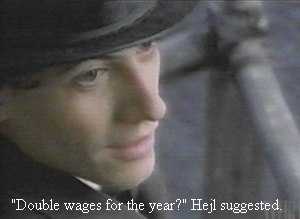 "Yes, sir. How much sir?"
"Yes, sir. How much sir?" 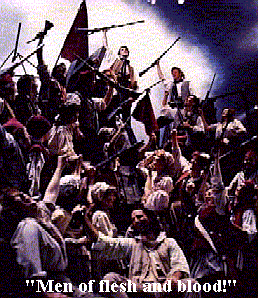 Another cheer, more courageous this time.
Another cheer, more courageous this time.


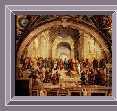
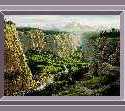
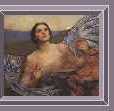
 (c) 1999
(c) 1999
Updated 13 June, 2000
All Rights Held by the Author.
No part of these pages may be used or copied without express permission of the author.